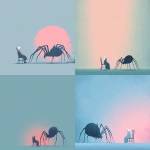Explore the Best AI Image Gallery

Beyond the Canvas: How Edge Computing is Transforming Creative Expression
The creative landscape is undergoing a seismic shift, fueled by the rise of powerful technologies like edge computing. This paradigm shift is blurring the lines between the physical and digital realms, empowering artists, designers, and innovators to push the boundaries of creativity in unprecedented ways.
A New Era of Creative Collaboration
Edge computing, which processes data closer to its source, is enabling real-time collaboration on a global scale. Imagine sculptors remotely sculpting with each other, musicians composing symphonies together from different continents, or architects building virtual models collaboratively. This immediacy and interconnectedness foster a new era of creative synergy, breaking down geographical barriers and unlocking collaborative potential previously unimaginable.
Interactive Art Experiences Redefined
Edge computing is fueling the creation of immersive and interactive art experiences that respond to viewers in real-time. Imagine an installation where your movements influence the flow of colors, sounds, or even the narrative itself. Artists can leverage edge computing to create personalized and dynamic artworks that engage audiences on a deeper level, blurring the lines between observer and participant.
Augmented Creativity: Enhancing Artistic Expression
Edge computing is seamlessly integrating with augmented reality (AR) and virtual reality (VR) technologies, providing artists with powerful new tools to enhance their creative expression. Imagine painters using AR overlays to visualize textures and colors before applying them to a canvas or musicians composing music within immersive VR environments that respond to their actions. These tools empower artists to explore new artistic dimensions and push the boundaries of imagination.
Ethical Considerations: Navigating the New Frontier
While edge computing offers immense potential for creativity, it also raises important ethical considerations. Data privacy, algorithmic bias, and the ownership of creative works generated using AI are crucial issues that need careful consideration. As we embrace this new frontier, it is essential to establish guidelines and frameworks that ensure responsible and equitable use of these powerful technologies.
Future Trends: The Ever-Evolving Landscape
The future of creative expression with edge computing is brimming with possibilities. We can expect to see:
- More sophisticated AI-powered tools that assist artists in generating and refining their work.
- Hyper-personalized art experiences tailored to individual preferences and interactions.
- Decentralized creative platforms where artists can connect, collaborate, and monetize their work directly.
- The integration of edge computing with emerging technologies like blockchain and the metaverse, creating entirely new realms for artistic exploration.
Edge computing is not just a technological advancement; it is a paradigm shift that is redefining the very nature of creativity. By embracing its potential while navigating its ethical complexities, we can unlock a future where art transcends boundaries and empowers individuals to express themselves in unprecedented ways.
](https://images.ai-img.art/thumbnails/150/3dfec1f7632cb4fdab02c2b2738cd475c9ad3d3e5a44e189365504a6896257e5.webp)



](https://images.ai-img.art/thumbnails/150/b479c71b9ce8c42d36eb158c561ae1646c708454c4ba90e72fd68296c6f57a52.webp)





](https://images.ai-img.art/thumbnails/150/ad3cb3100f90e6de3389b2120c30dfebc1ecb4df72654cc0054142252adad55e.webp)

](https://images.ai-img.art/thumbnails/150/cc041db2ba44df3a2e110a04455c0fdf49948bd67b77c022669df3888598468a.webp)






](https://images.ai-img.art/thumbnails/150/883252ab14abf449fba143e8d015b52b6505022ee5604f20e930fea350435cff.webp)
](https://images.ai-img.art/thumbnails/150/96a508d95e7379269fe047fb05a8b984468c71039b86d4b2081b6b4eebed1b65.webp)











](https://images.ai-img.art/thumbnails/150/40f5616ec109375a4883745aaff6fff89d478c5edd1780ba62f32268b6f0e47a.webp)









](https://images.ai-img.art/thumbnails/150/22a89c3014358777d6ad4d354d18a54c5f6f12afba558ff75c91b8eb4053130a.webp)





](https://images.ai-img.art/thumbnails/150/0b4c2ca8fd3b2962df2206ca8810fdae99efcdfc1a9b8aa68a113d256347af4f.webp)
